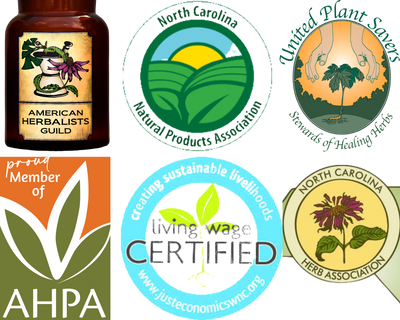What to Avoid in Your Herbs
What's Really In Your Herbal Products?
If you are buying herbs at your local wellness store or online and either you don't know the farmer or wildcrafter supplying the plant material or it's not a small business with integrity that does their plant sourcing on a small scale and in-house, the unfortunate truth of the herb market today is that you may not be getting exactly what you think you're getting at all. Here, a pharmacist and herbalist at Memorial Sloan Kettering warns consumers that many herbal supplements on the market may not contain what they claim.
While scenarios like this are dumbfounding and can be scary, they are also a desperate call for a renewed focus on quality. Quality and sustainably produced herbs, according to research by Dr. Ann Armrecht, PhD, of the Sustainable Herbs Program, ought to:
- Ensure safety, efficacy, and affordability.
- Employ production methods that conserve biological diversity and rejuvenate ecosystems.
- Promote and enrich cultural diversity while bolstering economic resilience through fair wages and robust livelihoods for all participants.
Quality herbs are also defined by Good Manufacturing Practices (GMPs). You can find out more about our GMPs and why these are such a big part of determining herbal quality here and here.

What to Avoid When Purchasing Herbs
- Synthetic preservatives, additives, flavors, colors, and fragrances. Even "natural flavoring" which can mean so many different things, from a truly naturally occurring chemical to a concoction of unrecognizable fragrances and flavors. Parabens, for example - these preservatives are used frequently in wellness supplements, pharmaceuticals, and food items and they do a great job of preventing bacteria and mold. But they have also been linked to endocrine disruption and other negative outcomes and are not considered safe for long-term consumption.
- Phthalates, contained in many personal care and wellness items. Many of us know to watch out for these but we can gloss over how serious the health impacts really are. Research suggests a potential connection between exposure to phthalates and a heightened risk of specific health issues, such as asthma, allergies, obesity, and diabetes. People also steer clear of phthalates due to research about their endocrine disrupting capabilities and environmental concerns.
- Glycols are water-soluble organic compounds commonly used in the food, cosmetic, pharmaceutical, and personal care industries. This is despite long-term data about their safety for human use, and abundant instances of skin irritation and allergic reactions.
- Petroleum and its cheap derivatives such as mineral oil are not only detrimental to the health of the planet due to being a non-renewable resource, but they carry major health concerns related to contaminants and impurities, not to mention their pore-clogging tendencies.
- DEA and BHT--potential carcinogens and known endocrine disruptors, especially when mixed with various other ingredients--are also commonly used in wellness and personal care products from lotions and rubs to body oils.

What to Look for When Buying Herbs
- Organic menstruums. Menstruum is the technical term in herbal formulation that means the liquid solvent that the herb is extracted in. In most of our extracts, organic cane alcohol is the menstruum.
- Organic herbs. For peak potency, our herbs undergo careful handcrafting in small batches. We meticulously harvest them at their prime, aligning with the cycles of the moon, seasons, and weather to capture their full vitality, most often processing them fresh for optimal extraction.
- That's it! Nothing else. Less is more. Enough said.
Whether you source your herbs straight from us, make them yourself, or support your local health food store or e-retailer is up to you, but we encourage and challenge you: do your research, learn where your herbs come from, and if there is any lack of transparency, go somewhere else. Your herbs will be more effective and do more for you when you are picky with your quality and sourcing.
We pride ourselves on a product line that goes beyond organic. All of the herbs we use are either Certified Organically Grown, (non-certified) naturally grown with organic-approved herbicides and pesticides as needed, or ethically wildcrafted. All of our menstruums - primarily cane alcohol, olive oil, and apple cider vinegar - are 100% Certified Organic. We make our products simply without any additives or artificial ingredients.

Even the vitamin E that we add in tiny amounts as a preservative to certain oils is non-GMO and derived from sunflowers. We are admittedly obsessed with quality and small amounts. Our philosophy is a bit old-fashioned "if you want it done right, do it yourself"--which is why we grow our own herbs at our studio in Candler, NC, as much as possible, and have a local team of in-house farmers for organic production when we can't.
Happy hunting for quality herbs--and remember this rule of thumb: if you can't pronounce it, don't put it in on/in your body (except when it comes to the botanical names of herbs, of course--try to say Escholzia californica [California poppy] or Xanthorrhiza simplicissima [yellowroot] three times fast!).






